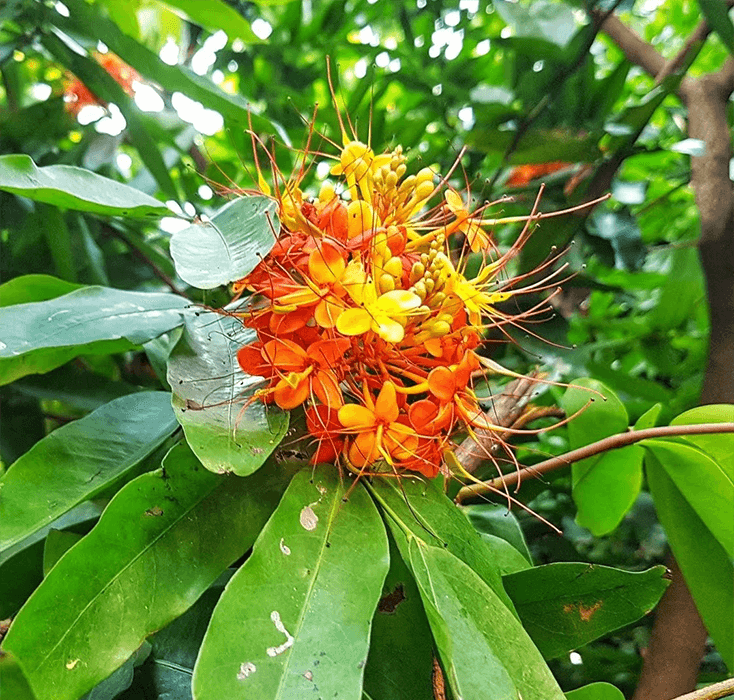Ashoka tree is one among the sacred legendary trees of India.Ashoka – means reliever of grief.The Latin name of Ashoka is Saracaasoca and it belongs to the family Leguminosae. It is commonly called a tree which is important to decrease your sorrows. This tree has got great religious significance and is also worshipped by some people in parts of India. It is known as "friend of women" as it is specifically used in the management of raktpradara (menorrhagia) and other female reproductive problems.
Regional Names of Ashoka
- Hindi name – Ashoka
- Bengali name – Ashoka
- Tamil name-Asogam , Asogm,Malaikkarunai,Asogu, Asokam,Sasubam
- Kannada name– Aksunkar, Ashokadamara, Achenge, Kankalimara
- Telugu name – Asoka, Asokapatta
- Malyalam name – Asokam
- Marathi name – Ashoka, Jasundi
- Gujarati name-Asopllaka
- Orissa name-ashoka
- Kashmiri name– Ashok
- Punjabi name- Ashok
- Assamese name-Ashoka
- English name– Asoka
- Arabic name – Shabuqa
- Urdu name- Ashoka
- Sinhalese – Diyaratambala,Asoka,Diyaratmal
- Siddha – Asoku
Classification of Ashoka
Superdivision
Spermatophyta
Habitat of Ashoka
Ashoka (Saracaasoca) is a rain-forest tree. It is a native of Asia and South America. This tree is originally distributed in the central areas of the Deccan plateau. It is also found in the Western Ghats of the Indian subcontinent, in the center and the Eastern Himalayas and the hills of Khasi, Garo, and Lushaj. Ashoka is common to all parts of Indian and the other countries. In India, it is easily available in West Bengal, Kerala, Maharashtra, Andhra Pradesh, and Meghalaya.
Chemical Composition of Ashoka
Ashoka Bark is rich in tannins, Haematoxylin, flavonoids, steroids, saponins, volatile oil, glycosides, catechol, carbonic calcium, iron, ketosterol, and various steroidal glycosides. Ashoka Leaves contain various carbohydrates, tannins, gallic acid, and egallic acid. Ashoka Flowers are rich in saracasin, saracadin, waxy substances, proteins, carbohydrates, and steroids. Ashoka Seeds contains various fatty acids like oleic, linoleic, palmitic and stearic acid.
Ayurvedic Properties of Ashoka
The meaning of this quotation goes as:
|
Hindi / Sanskrit
|
English
|
|
Rasa
|
Kashay, Tikta
|
Taste
|
Astringent, Bitter
|
|
Guna
|
Laghu, Ruksh
|
Physical Property
|
Light, Dry
|
|
Veerya
|
Sheeta
|
Potency
|
Cold
|
|
Vipaka
|
Katu
|
Undergoes pungent taste conversion after digestion
|
Pungent
|
Ashoka Effect on Doshas
Ashoka balances Kapha and Pitta dosha
|
Dosha
|
Effects
|
|
Vata
|
=
|
|
Pitta
|
–
|
|
Kapha
|
–
|
Ashoka Uses and Benefits
Ashoka can be used in various forms for different health conditions such as in tablet form, powder form, juice form, decoction form, capsule form and paste form. It can be used externally and internally according to the condition.
External Uses
The local application of Ashoka paste on the affected part is effective in relieving pain.
- Also, Ashoka paste is applied locally in the case of poisoning as it has antidotal properties.
Internal Uses
- It is beneficial in relieving pain by acting on nerves, so used in vata conditions.
- It helps in treating common problems of digestion like bloating, flatulence, burping, colicky pain in abdomen, diarrhea, dysentery and ascites, etc. can be relieved with the use of Ashoka.
- It is used in reducing thirst and in the treatment of helminthiasis.
- Ashoka flowers have astringent properties and are beneficial in internal bleeding, hemoptysis.
- Ashoka helps to regulate blood composition and stabilize blood circulation making it optimally available to all the body parts, curing various blood disorders and oedematous conditions in the body.
- In females, it is very commonly used to regularize hormones and menstrual cycles. It improves the strength and stamina in females having menstrual irregularities such as dysmenorrhea and menorrhagia. Also beneficial in leucorrhea.
- Likewise Arjuna, Ashoka is also a cardiac tonic that can act as supportive therapy for people suffering from hypertension, circulatory problems, edema & congestive heart failure, etc.
- Its bark has natural detoxification properties that improves skin complexion and keep the body free from toxins.
- Ashoka has cooling properties that are useful in reducing the burning sensation and in lowering the body temperature in fever.
- Seeds powder of Ashoka is effective in dysuria and renal calculi. Also, it prevents the reformation of calculi.
Part Used of Ashoka
The parts of the ashoka used in the formation of medicine are –
- Ashoka Bark
- Ashoka Flowers
- Ashoka Seeds
Dosage of Ashoka
- Syrup – 10 to 15 ml
- Seed powder – 1 to 3 grams
- Flower powder -1 to 3 grams
- Bark Decoction – 15 to 30 ml
Easy ways to utilize Ashoka at Home
It can be used at home in many ways as follows:-
- ½ teaspoonful of Ashoka bark powder along with mishri helps in curing leucorrhoea.
- Ashoka bark powder due to its cold potency can be taken at home in case of fever.
- In the case of frequent urination and renal calculi, Ashoka seed powder 1 -2 tsp with water is beneficial.
- To lower the blood glucose levels in diabetic patients, grind dried Ashoka flowers with water and use it twice daily, approx. 20 to 30 ml daily.
- Ashoka flowers powder are mixed with coconut oil and applied over skin if having scabies, atopic dermatitis and eczema.
- Local application of decoction of Ashoka flowers + Hena leaves + coconut oil is beneficial in various fungal infections.
- Ashoka bark is boiled in water and can be used for washing the skin surface in case of skin infections.
Caution to Be Taken
- It should be used in pregnancy, lactation and children only after consultation with physician
- It has cardiotonic action according to Raj Nighantu but it should be used in cardiac ailments only under medical supervision.
- Overdose of Ashoka can lead to constipation, so the proper measured dose should be taken.



